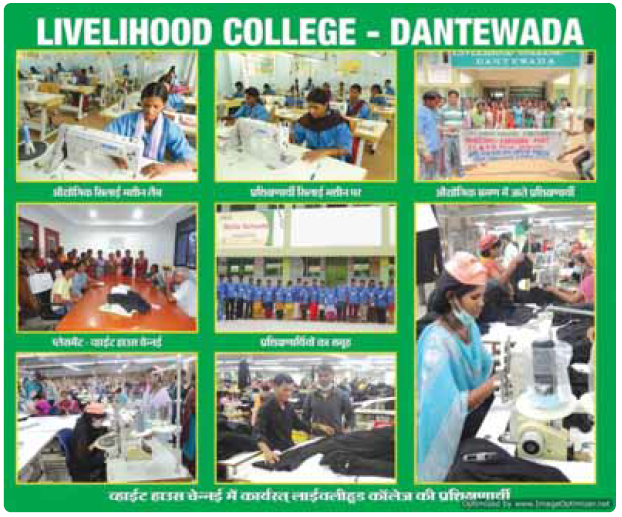Livelihood Colleges in Chhattisgarh
Livelihood Colleges in Chhattisgarh
Background
The Chhattisgarh Right of Youth to Skill Development Act, 2013 ensures every person in the age group of 14-45 the right to develop his/her skills from among notified skills. District Skill Development Authorities set up under District Collectors are bound to provide skill development training within 90 days of receiving any demand in this regard.
Government of Chhattisgarh facilitates large population of unemployed youth/tribal population living in remote and under-Served areas in States to undergo livelihood training to increase their employability / ability to earn a livelihood by providing residential training facilities through Livelihood Colleges.
Initially, a Livelihood College was executed as pilot project in Dantewada district (South Bastar), wherein, youth in this predominantly tribal and naxal violence affected district were provided training in a range of Skill sets.
Intervention
State Government in July 2013 approved "State Project of Livelihood Colleges" for free skill development training to the youth. The programme involves skill development facilities under one roof.
Training is provided in short-term, market Oriented, demand driven MES Courses. It facilitates multi-entry, multi-exit, multi-skilling with linkages to future up gradation opportunities. There is assistance for post training placement and Very less entry barriers.
With the objective of placing the Livelihood College initiative on a robust foundation with strong employment linkage, and to create a network of such Livelihood Colleges to provide a range of livelihood opportunities for students from across the state including in partnership with the private sector, the state government has established the State Project Livelihood College Society. The Governing Council of the Society is chaired by the Chief Minister and its Executive Committee is chaired by the Chief Secretary.
The training costs are met from the State's skill development Convergence Scheme, Mukhya Mantri Kaushal Vikas Yojana, in which skill development Schemes and funds of various departments are being Converged. In addition, since 2015-16 budgetary support too is being given for skill development training.
Different models are being taken up by the society for achieving the goal of employment-linked skill development for the youth of the State viz. departmental training, training through reputed private Sector partners, and training under Corporate social responsibility by established players. In involving private players, the society is offering physical infrastructure, mobilization and facilitation in return for a Commitment towards employment from prospective partners.
Based on Skill gap analysis, a perspective plan for 3 years has been developed. Chhattisgarh State Skill Development Authority has identified for training reputed national level training partners in eleven skill Sectors (Beauty & Wellness, ICT, Banking & Accounting, Construction, Painting, Automotive Repairs, Security, Garment making & Fashion designing, Retail, Telecom and Hospitality). So far, 27 Livelihood Colleges have been established in 27 Districts to provide quality training, infrastructure & ensure presence of reputed training partners in each district, Livelihood College's new building construction has started in 24 districts. Skill Training is provided absolutely free of cost to the beneficiaries.
Skill requirements and skill preferences of 7,76,040 youth (Rural - 6,50,321 and Urban 1,25,719, Males -4.21,241 and Females - 3,54,493) have been identified through a state Wide Skill Preference Based Household Survey in all 27 Districts. Online entry of the data has been done in the CSSDA portal. Unique Skill identity (USI) Number has been generated for every youth whose details have been entered which will enable the tracking of the prospective trainee's entire skill cycle i.e. from Counselling to placement to retention for at least 3 months.
Improving the accessibility and quality of training by proper counselling before training batch allotment, training to Rojgar Sahayak in various trades and alignment of training with National Skills Qualifications Framework (NSQF) is ensured.
A web portal based facilities are used for (a) registration of beneficiaries for skill training; (b) cost claim facility for assessing body and assessment fee collection through Multi Option Payment System (MOPS) which was earlier through DD or cheque; and (c) preparation of Comprehensive Database of Beneficiaries.
Attendance through biometrics device is must for all trainees. Initiatives like Facebook Connect by Chief Minister was taken up to generate greater public awareness regarding skill development activities ins state among youth. The idea is to make skill development activities paperless, transparent, more accountable and efficient.
Special batches are started for Particularly Vulnerable Tribal Group (PVTGS), Transgender, Differently-abled, Destitute women, Widows, etc. The Placement camps are organised at Divisional and District level to place trained youth. Skill Olympiads are conducted for skill development awareness among youth of Chhattisgarh.
Given region's special circumstances, one more Livelihood College has been recently established in worst LWE hit Antagarh block of Kanker District. 3 Livelihood Colleges are currently running in PPP mode under CSR activity of ICICI, Jindal Steel, and SIS etc.
Impact

- 27 Livelihood Colleges established in 27 Districts to provide duality training infrastructure & ensure presence of reputed training partners in each district.
- In all such colleges placement percentage is very high - e.g. ICICI Academy for Skills has placed 98.95% While the Gariyaband College of Security established with SIS has placed 81 % of the candidates trained so far. So far over 36000 youth have benefitted in different skill sectors.
Key takeaways
- For difficult areas such as LWE affected areas, it is very important to provide residential training free of cost to unemployed youth with the objective to provide them with employment and self-employment opportunities and an avenue to channel their energy while contributing to the economic development through participation in the labour force.
- The private sector participation in training has helped in improving quality of training with higher placement.
- Skill development facilities under one roof provide congenial environment to the trainees.
To know more, click here.
Last Modified : 7/1/2024
This topic provides information about the Converge...
This topic provides information about Transport Mi...
This topic provides information about Coastal Regu...
BGREI a lateral scheme to RKVY is to address the c...
